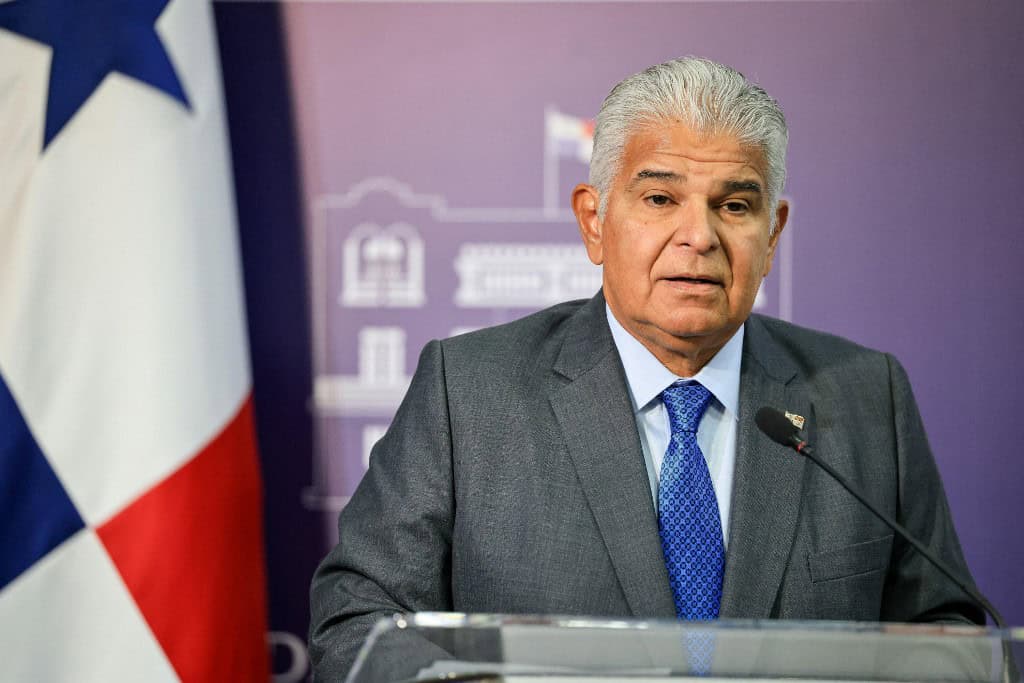The Panamanian government on Thursday called the U.S. government’s announcement that its ships would not pay for transiting the Panama Canal “absolutely false,” a toll that Washington considers “absurd.” Amid tensions over Donald Trump’s threat to retake control of the waterway, Panamanian President José Raúl Mulino said the information about toll-free passage is based on “lies” and “absolute falsehood.”
“This is intolerable, plain and simply intolerable,” Mulino said forcefully at a press conference, adding that he will speak with Trump by phone on Friday at 15:30 local time (20:30 GMT). The State Department stated Wednesday on social network X that the Panamanian government agreed to “no longer charge fees to U.S. government vessels,” which would represent a “savings” of millions of dollars.
On Thursday, U.S. Secretary of State Marco Rubio said in the Dominican Republic that he finds it “absurd” that his country must pay fees “to transit a zone” that it is obligated “to protect in times of conflict.” But the Panama Canal Authority (ACP), the independent entity that manages this strategic waterway, quickly denied having adjusted the fees.
“It’s not like the canal toll is breaking the United States economy… it’s around 6 or 7 million dollars per year based on the number of vessels that cross,” said Mulino, referring to military ships. Although it contradicted Washington, the ACP assured in a statement its willingness to dialogue with the United States “regarding the transit of warships.”
The 80-km interoceanic route, inaugurated in 1914 and through which 5% of global maritime trade passes, was built by the United States and handed over to Panamanians in December 1999 under bilateral treaties. Jorge Quijano, former canal administrator, told AFP that Panama “would violate the treaties” if it exempts the United States from payment because it would be discriminatory against other countries.
Audit Against Chinese Company
The controversy arose after the U.S. diplomatic chief’s visit to Panama on Sunday, where he conveyed to Mulino concerns about Chinese “influence” in the canal. The United States considers it a national security threat that Hong Kong company Hutchison Holdings operates, under concession, two ports at the canal entrances, believing Beijing could close it in case of conflict.
Mulino recalled that Panama Ports, a subsidiary of the Chinese company, is under a “comprehensive audit” and he will wait for the results before making a decision about the 25-year concession, established in 1997 and renewed in 2021. “If they violate the concession terms or cause imminent economic harm to the country, we will act accordingly, but for now the audit stands,” he emphasized.
Since winning the election in November, Trump has not ruled out using force to retake control of the canal, through which more than 40% of U.S. container traffic passes, according to U.S. government data. The United States, with 74% of cargo, and China, with 21%, are the main users of the waterway, according to ACP data.
Belt and Road, Canceled
Following Washington’s pressure for Panama to distance itself from China, Mulino announced Thursday the cancellation of the Belt and Road economic agreement, signed in 2017 by the then-Panamanian government and set to expire in 2026. Mulino assured that Panama’s embassy in Beijing officially presented the “cancellation” document. “It’s a decision I made,” he emphasized.
The agreement, which contemplates financing infrastructure projects with Chinese funds and promotes trade, is Xi Jinping’s government’s flagship program. On Wednesday, Chinese foreign ministry spokesman Lin Jian had said that “cooperation between China and Panama under the Belt and Road framework” was developing “normally” and bearing fruit. He expressed hope that “parties resist external interference.”
Rubio had considered Panama’s decision not to renew the agreement a “great step” toward strengthening relations with Washington on Monday.






